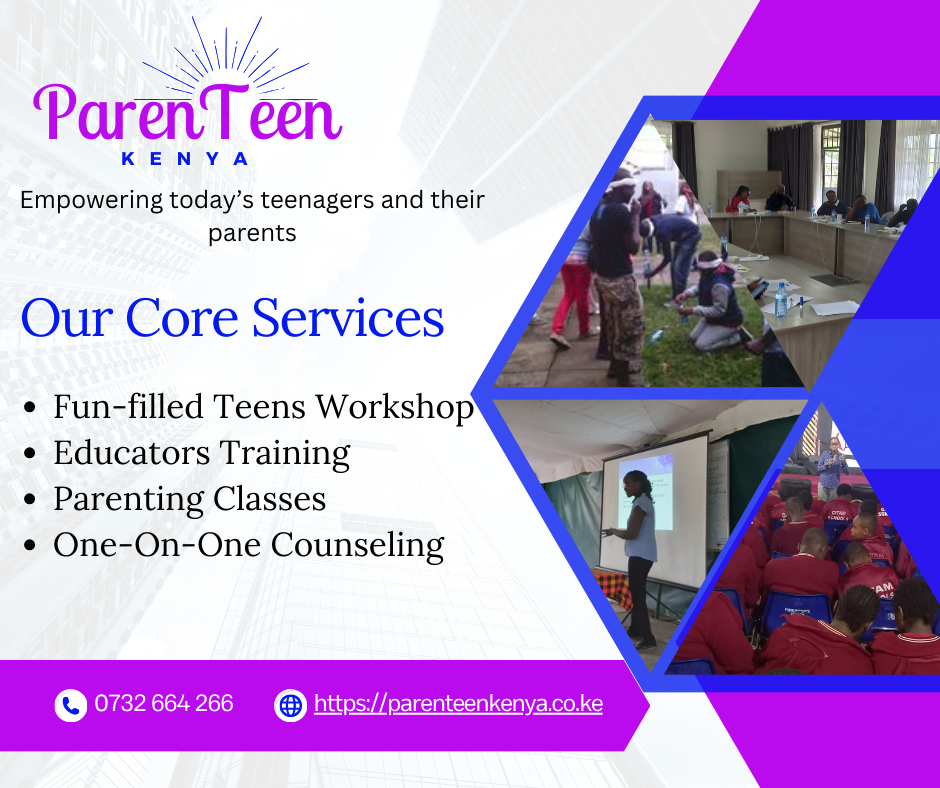Are you exhausted from lying awake all night worrying about your teenager on drugs?
Do you despair over failed attempts to convince them to stop using and seek help?
Worse still, are you tired of the endless fights and open defiance?
It’s time for you to find ways to cope with having a teenager on drugs.
These experiences are not unique to you alone. Parents with teenagers on drugs across Kenya go through the same struggles.
The worry, fear, and frustration can cause your life to come to a standstill, and maybe it has.
Thankfully, ParenTeen Kenya will give you four ways to assist you in coping with a teenager on drugs. We will help you find a support group, set boundaries, choose a self-care practice, and tell you why seeking professional help is worthwhile.
Look for Non-Judgemental Support
“Two are better than one, because they have a good reward for their toil. For if they fall, one will lift up his fellow. But woe to him who is alone when he falls and has not another to lift him up!” Ecc4:9–10
Dealing with a teenager on drugs is quite challenging. Sometimes you may question if your response to the situation was right or if you went too far.
Other times you wonder if you’ve done all there could be to deal with the situation or if there’s something more you could do.
In these circumstances, you should have someone or a group of people you can talk to. The following are suggestions of individuals you can seek support from:
- Friends and family: Look for a close friend or family member willing to listen to you and offer guidance regarding your current situation. This individual should be someone you won’t feel judged by or make you feel guilty afterward. They should be a source of relief when you feel overwhelmed.
- Support groups: These are groups of more than two people you interact with regularly to discuss the challenges of having a teenager. It can be a community group, neighborhood initiative, or an online private group like this Facebook group.
- Churches/Faith-Based Organizations (FBO): Various churches or FBOs know the challenges parents go through with their teenagers and have groups that help them cope. They also organize seminars to assist parents in learning how to raise their children. Search in your community for a church or FBO that organizes such activities.
Sadly, some parents keep the struggles they have with their teenagers to themselves because they have an image to maintain. As a result, they carry a heavy burden that causes them prolonged mental, emotional, and physical suffering.
To avoid this outcome, take courage and seek help to save yourself from the sleepless nights and the mental torture you can resolve by reaching out to someone.
Set Clear Boundaries

Undoubtedly, you love your teenager regardless of the challenges you are having with them. But that doesn’t mean they can walk all over you and disrespect you or other family members.
Setting boundaries helps to establish expectations and consequences for behavior. For example, you may not control whether they use drugs or not, but you can require them not to use or store the drugs in the house.
Such boundaries can provide a sense of structure and stability for you and your teenager. Some tips for setting boundaries with your teenager are as follows:
- Be clear: Make sure your expectations are clear and specific. Let your teenager know what is and is not acceptable behavior and the consequences if they cross those boundaries.
- Be consistent: Consistency is key when it comes to setting boundaries. Follow through on consequences when necessary, and don’t compromise your expectations.
- Involve your teenager: Include your teenager in the process of setting boundaries. Ask them what they think is reasonable, and be willing to listen to their input.
- Use natural consequences: Natural consequences are disciplinary actions that arise naturally from a behavior rather than being imposed by a parent. Learn more about how to choose the right consequence in the linked article.
- Keep lines of communication open: Setting boundaries does not mean shutting down communication. Keep the lines of communication open and encourage your teenager to talk to you about their thoughts and feelings.
Setting boundaries is not about punishment or control, but about establishing a safe and healthy environment for you and your family. You will enjoy more peace in the process.
Practice Self-Care
Having a teenager going through adolescence is already a challenge for any parent. In your case, the struggle may be double or triple because you have to deal with the influence the drugs have on your teenager.
Hence, practicing self-care is crucial for your mental and physical health, as well as for the health of your relationship with your teen. The following are some self-care tips you can implement to help you cope:
- Establish personal time: It is important to create some time to relax and recharge. You can walk, read a book, or do something you enjoy. These activities help you clear or distract your mind from the current situation.
- Prioritize your health: Eating well, getting enough sleep, and exercising regularly can all help you feel better physically and emotionally. If you are struggling with sleep, search online for videos such as the one below to learn ways to help you sleep better.
- Avoid blame and guilt: Remember that addiction is a complex issue, and you are not to blame for your teenager’s choices. Try to let go of guilt and focus on what you can do to support your child’s recovery.
- Pray and study the scriptures: God is a source of hope, encouragement, and comfort for people going through challenging times. Talking to Him and understanding what he says in scripture can help you cope. It is through scripture that God speaks to us and gives us what we need to press on amid difficulties.
Practicing self-care is not selfish but a necessary part of being a healthy and effective parent. You’ll be better equipped to relate with your teenager by taking care of yourself.
Seek Professional Help
You may be wondering why you may need to seek professional help when it’s your teenager who needs it the most. But, seeking professional help can be a valuable resource in coping with the challenges of having a teen on drugs. Some ways seeking professional help can assist you with are:
- Understanding addiction: Addiction is a complex and often misunderstood disease. Seeking professional help can provide you with a better understanding of addiction and how it affects your child.
- Coping strategies: A counselor specializing in addiction can offer guidance and support for coping with the emotional and psychological challenges of parenting a teenager with addiction. They can help you develop coping strategies to manage stress, anxiety, and other difficult emotions.
- Communication: Communication can be difficult when dealing with addiction. A therapist can guide you on how to communicate effectively with your teenager and establish healthy boundaries.
- Resources: Professional help can provide you with access to resources that can support your child’s recovery, such as treatment centers, support groups, and educational materials.
- Personal support: It can be challenging to navigate the emotional rollercoaster of having a child with addiction. Seeking professional help can provide you with personal support and guidance through this tough time.
Seeking professional help is not a sign of weakness but a step towards finding solutions and support for yourself and your child. A professional can offer a safe and confidential space to discuss your concerns and provide personalized support and guidance.
Ready to Take Your Life Back?
Learning ways to cope with a teenager on drugs equates to fighting to get your life back on track. It is exhausting to deal with the aftermath of your teenager’s drug use, so you must take care of yourself. PareTeen Kenya can give you the support you need. Get in touch with our psychologist today and start getting your life back on track.
Frequently Asked Questions
How can I talk to my teenager about drug addiction?
Talking to your teenager about drug addiction can be challenging, but having an open and honest conversation is important. Be compassionate and non-judgmental, and emphasize your concerns for their health and safety. Avoid accusing or blaming language and instead focus on listening to their thoughts and feelings.
What should I do if I suspect my teenager is using drugs?
If you suspect your teenager is using drugs, you need to take action. Start by having a conversation with them and express your concerns. You may also consider seeking professional help from a therapist, counselor, or addiction specialist who can guide and support you and your teenager.
How can I care for myself while supporting my teenager through addiction and recovery?
Practice self-care by engaging in activities that promote your mental and emotional well-being, such as exercise, meditation, or spending time with friends. Seek support from a counselor who can provide guidance and support for you as you navigate this challenging time. Contact ParenTeen Kenya today, and let’s help you through the challenging period.
Images by Unsplash and Pexel
Jane Kariuki is a devout Christian, Clinician, Psychologist, and founder of ParenTeen Kenya. She authored an exceptional training manual used in her teens’ workshop and an instructional guidebook for her parenting classes. If she is not training, blogging, or counseling, Jane loves to spend time with her sweet husband and three children.







